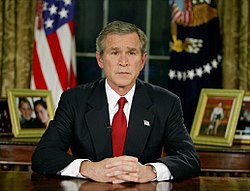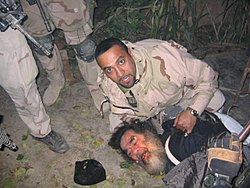| |||||
| Decades: | |||||
|---|---|---|---|---|---|
| See also: | Other events of 2003 List of years in Iraq | ||||
The following lists events in the year 2003 in Iraq.
| |||||
| Decades: | |||||
|---|---|---|---|---|---|
| See also: | Other events of 2003 List of years in Iraq | ||||
The following lists events in the year 2003 in Iraq.
Transitional government:





As part of the CPA plan of "De-Ba'athification" Americans briefly paid many Iraqi soldiers who Saddam failed to compensate with wages around the time of the U.S. lead invasion. On October 5, 2003, those payments abruptly came to an end when cash ran out ahead of the announced timetable for such payouts. Many soldiers of the Iraq Army still had yet to receive their wages either from the Iraqi government or the Coalition. Now jobless and without an income a crowd of appx 20,000 people, largely former soldiers and Ba'ath party members gathered at the pay sites location on Damascus Street in Baghdad and began a demonstration that quickly developed into a full-scale riot. A notable uptick in "insurgency" attacks against coalition forces followed soon thereafter.


| | This section needs expansion. You can help by adding to it. (October 2010) |